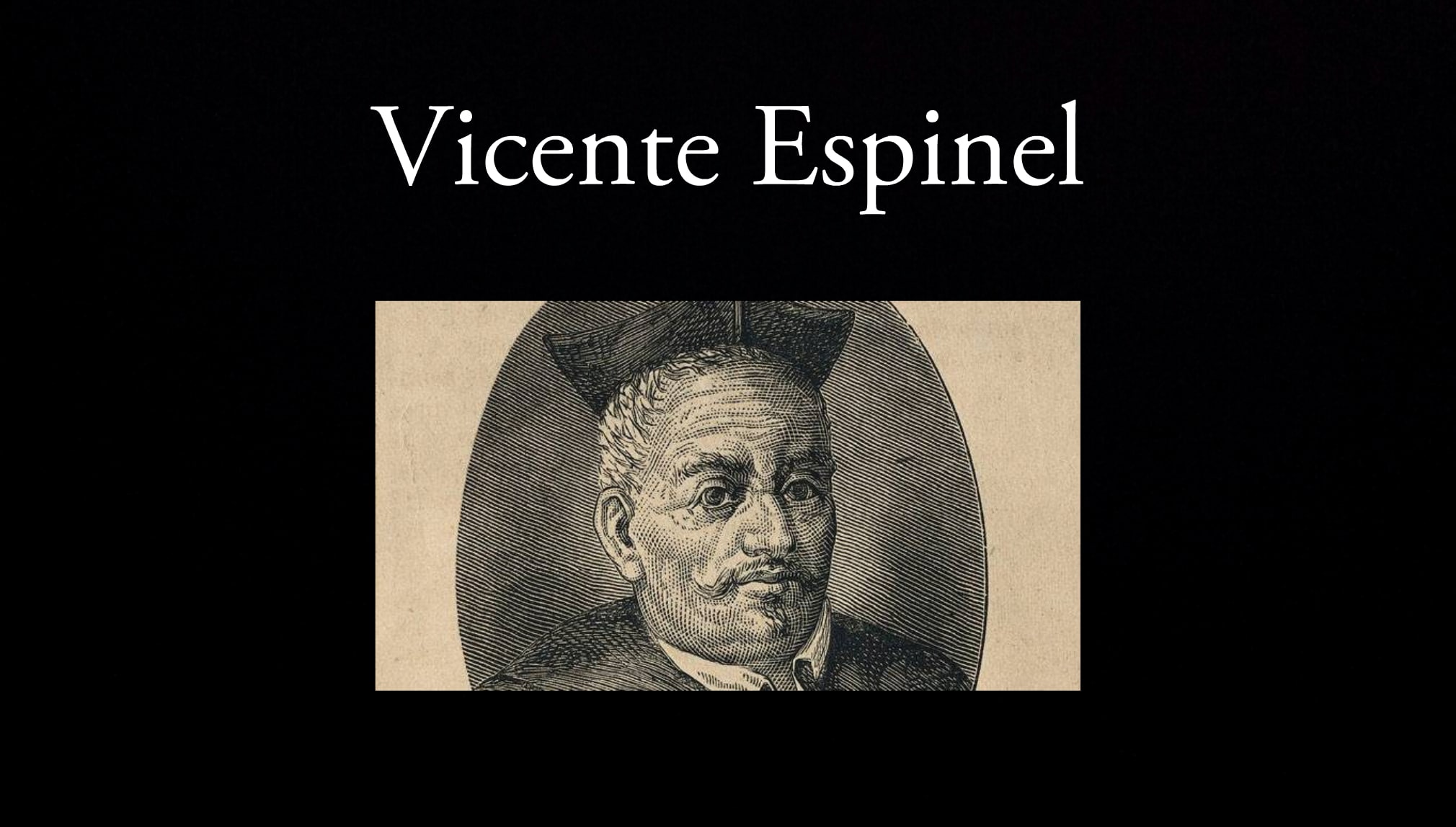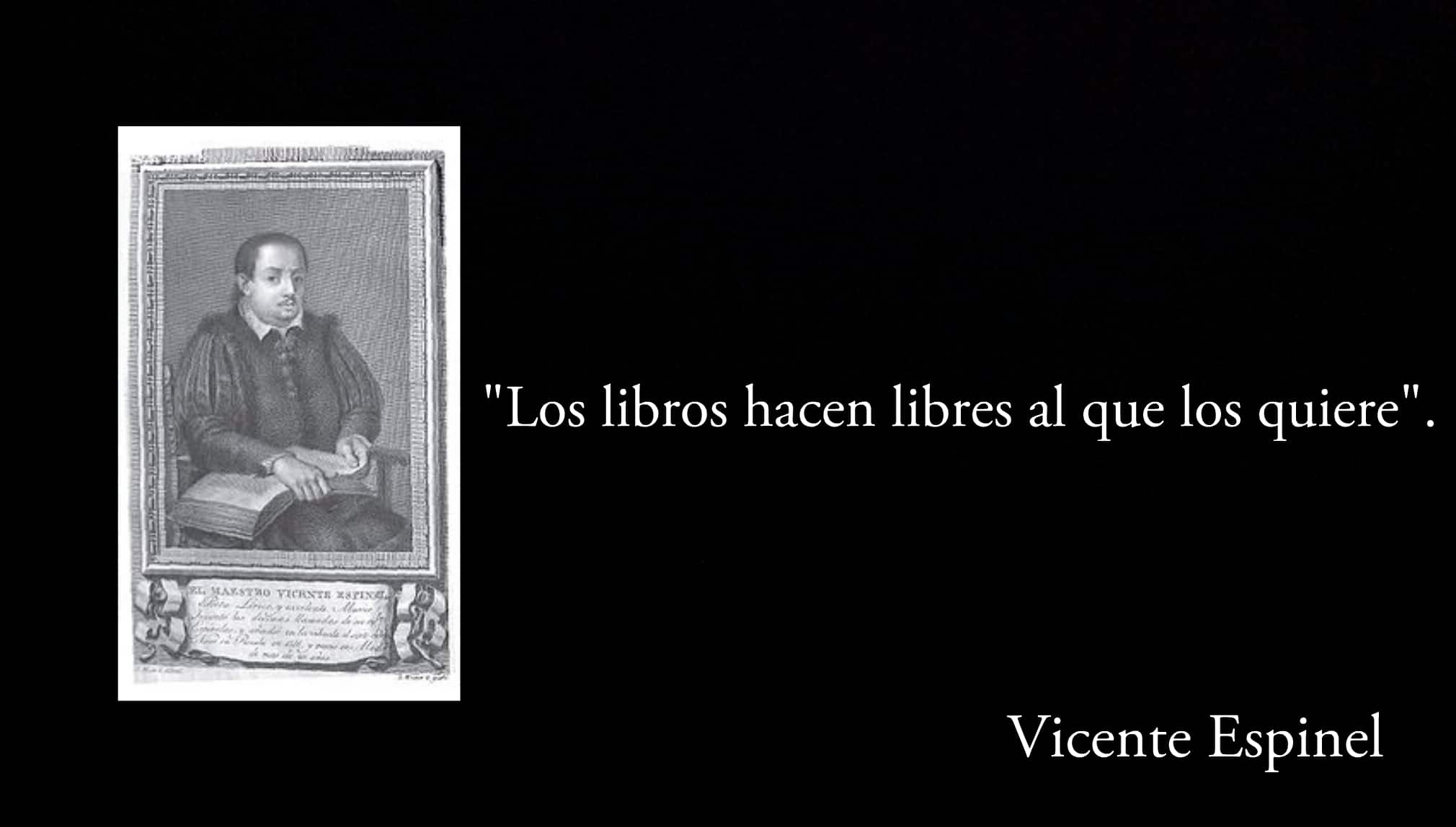
Vincent Spinel.
In Spain and Latin America, Vicente Espinel is an obligatory reference in the field of music and popular declamation. It is not for less, the variation he made of the tenth has served thousands of poets and composers to convey their deepest feelings. The strength of his contribution lies in the simplicity and solidity of the idea.
However, there are many myths that revolve around her figure. Things that, from being repeated so much, have been taken for certain. Here we will try to elucidate some, and, of course, the door is left open for anyone who wants to make their contributions.
Questions that arise around Espinel
Analyzing the figure of Espinel, it is impossible that these questions do not arise:
Was Espinel the Inventor of the tenth?
Was the spinel formula his idea?
How many spinels did he write?
Why its fame?
I will try to answer these riddles.
The three things that many say about Espinel
It is common to hear about the poetic feats of Vicente Espinel. They are usually repeated among decimistas and admirers of the poet. Many shout:
- «Espinel is great! He created the tenth!
Others shout:
- «Espinel is great! He created the XNUMXth spinel!
Still others repeat out loud:
- «He wrote thousands of tenths! Is the best!".
These and many other phrases you can hear in gatherings and amateur gatherings. It is also repeated by people trained in the matter. However, as regards these three statements mentioned here - despite the first two seeming identical, and the three true - two are historically wrong. And yes, they are the product of repetition, the acceptance of criteria due to lack of preparation and the same popular imagery.
Clarifying a bit what is said
The first sentence is wrong. Espinel did not invent the tenth. This poetic form existed years ago, before he was even born. The third sentence is also wrong. Espinel did not write thousands of tenths. In fact, it didn't even reach a hundred. But, they will wonder:
- "And who invented the tenth?"
- "Why spinel?"
- "How many tenths did Espinel write?"
We go by parts, first it is necessary to clarify terms.
What is a tenth?
In poetry, a "tenth" is simply a stanza of 10 lines, eight syllables. Preferably and commonly, with variable rhymes according to the poet that he did to his liking and seeming. In the same vein, to speak of an inventor of the "tenth" is very daring and difficult due to the scarcity of material at the time in this regard. (XIV and XV centuries).
The truth is that, structurally, a tenth, within its common ancient forms, is composed of two «limericks» (stanzas of five verses of minor art with variable rhymes). Example: ababacdcdc, where verses 5 and 6, respectively, serve as connectors, both for the idea of the message that the poet wants to convey, and for the musicality or song of the poem. That versification shown here is not the only one that exists. It could be said that, for each poet, a type of tenth.
The popularity of the poetic form devised by espinel, the "spinel"
What happened was that, with the passing of time, some forms became more popular than others, due to their musicality and intonation. And, as in the case of Espinel, apart from the two factors mentioned above, it is worth highlighting the historical moment in which he lived and the admirers - very great men of letters - who sponsored him.
Now, a "tenth spinel" is a poetic variant devised by Vicente Espinel. Hence "spinel." 8 of them appear published in his book Various rhymes. This poetic form has the following rhyme structure abba.accddc. Each letter is the final syllable of each verse, and therefore its rhyme.
The definitive point (.)
You will be able to appreciate here, apart from the now famous rhyme achieved by Espinel and not seen before his contribution, another aspect: after the fourth verse, and it is not a typo, there is a period. This is placed entirely on purpose by this server and once by Espinel himself.

Phrase Vicente Espinel.
And while a period (.) Seems somewhat simple and not so bombastic, it added a unique strength and expressiveness to this poetic form. In fact - and it is necessary to limit - although it was extremely ingenious on the part of the poet (and has been emphasized by scholars and great men of letters of yesteryear and now), he, Espinel, perhaps, did not foresee the impact of said sign score in the future.
Some other types of tenths
Since its inception, various forms of tenths have been known. This, of course, regarding his rhyme. Although, today they are almost forgotten. Among these, we can name:
- aabbbcccaa.
- abbaccddcc.
- ababaccddc.
This last form is from Espinel, and also appears in Various Rhymes.
Espinel and his two great godparents
Now, the point clarified, Why, among so many poets, was Espinel's variant the most deeply rooted and widespread? Well, let's say Espinel was born with a lucky star.
The poet, apart from being talented and studious, owed his fame and the worldwide diffusion of his work to two other greats of letters: Miguel de Cervantes and Saavedra and Felix Lope de Vega, who, when reading their spinels in the book Various Rhymes, were stunned by the expressiveness that the poetic structure had taken with the changes that Espinel devised. So much so that they praised him at the most in his publications.
Something ironic about life, and it is good to note, is that Cervantes and Lope de Vega hated each other, so it could be said that they were united by their admiration for Espinel.

Lope de Vegas.
Lope de Vega's appreciation
Lope de Vega said in a triplet:
“Honor yourself well from your Ronda mountains,
because today his thorn becomes a safe palm,
Let his name hide ".
The price of Cervantes
Y Cervantes writes:
"I would say things about the famous Espinel
that exceed human understanding,
of those sciences that breeds in his chest
Phoebus' divine sacred breath.
But, because it can not of my tongue
say the least of the most I feel,
say no more, but aspire to heaven,
pray take the pen, pray the lyre ».
The only 10 known tenths of Espinel
Now, regarding the tenths that Espinel wrote - the only ones actually registered in his name - there are only ten.
The two dedicated "To Don Gonzalo de Céspedes y Meneses", which read like this:
I
"If there can be just evils,
These, Gonzalo, are such,
Well, of your tragic ills
you get general likes.
Know the robust breasts,
if in misfortune you get pregnant,
that with heavenly traces,
between grievances and complaints,
the misfortunes you run over
and you embrace the virtues ”.
II
"In the deep abysses
of your current misery,
Who made you be cautious
but your jobs themselves?
The parasites ceased,
doing evil courses;
plus your tragic speeches
they will publish your concepts
in secret booths
and in general contests ”.
And the eight spinels of Various Rhymes
These bear the title "redondillas". These poems constitute number 61 of the 86 compositions or "rhymes" that Espinel included in such an important work. These are:
I
"There is no good that keeps me from evil,
fearful and cowering,
of unreason offended,
and offended coward.
And although my complaint, it is too late,
and reason defends me,
more in my damage it ignites,
that I go against those who offend me,
like the dog that with rage
it offends its own owner ”.
II
"Already this luck, that worsens,
he looked so in the stars,
what made complaints about me
of whom I form them now.
And such is the lack, lady,
of this good, that of thought,
confused and sad I find myself,
what if they ask me about you
those that my damage suspect,
out of sheer shame I shut up ”.
III
"People often tell me,
that partly knows my evil,
that the main cause
I can see it written on my forehead.
And although I play the brave,
then my tongue slides
so it gilds and nuances,
that what the chest does not spend
no dissimulation is enough
to cover with ash ”.
IV
"If they name me, or if I name you
I live full of care,
ordinarily demure
with his beard on his shoulder.
That I am amazed by a thousand things,
because in my little luck
my luck is not sure,
that perhaps languages say,
which has been due to its own diminution
which was by misfortune ”.

Miguel de Cervantes.
V
"I want to introduce you
this truth as a witness,
than a declared enemy
I hold you true.
That although despised I die,
to be without reason despised
It is not, because of what has been lacking in me
that in all our speech,
as good taste as yours
he could not be fooled ”.
VI
"Only this satisfaction
I have so much damage left,
that never in such long years
my reason angered you.
More for more passion
it may be that you deny it,
that when you want you can,
but to such a great crime
an overwritten remains alive,
that you bring from my handwriting ”.
VII
"This gives strength to my faith
for his attempt to continue,
and your mercy don't say
I will not drink this water.
Could it be that what was
become like first,
that in your clemency I hope,
and I will not despair,
that it will not be fair to throw
the rope behind the cauldron ”.
VIII
"The tired thought
of the importunate pain
look for the best state
(if in love there is good condition).
That a chest so hurt
nor does glory feed him,
nor does the pain torment him,
how high the memory,
nor does he feel pain, nor glory,
neither good nor evil sustains him ”.